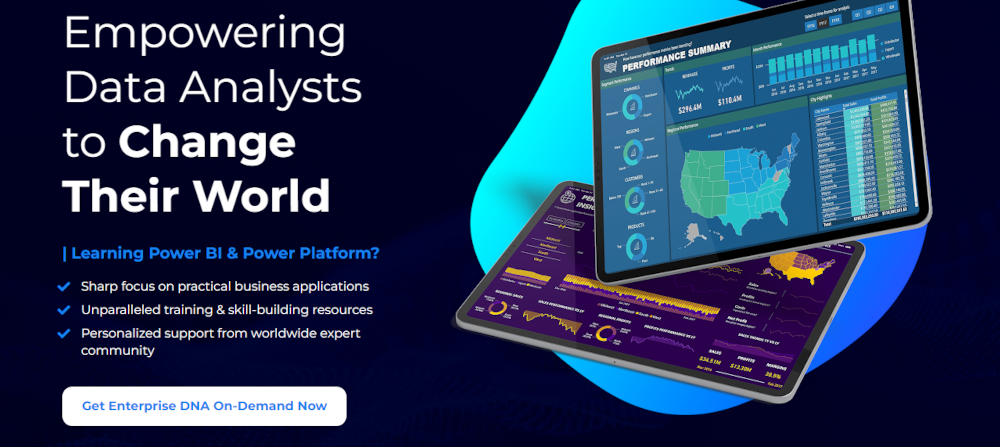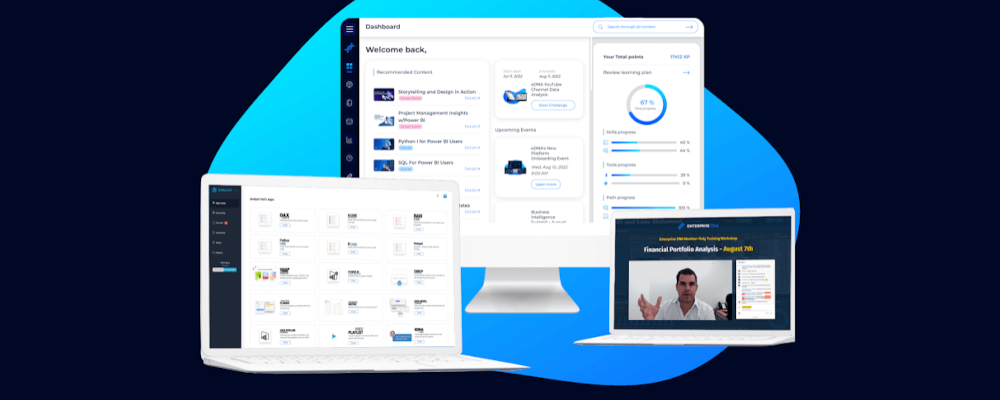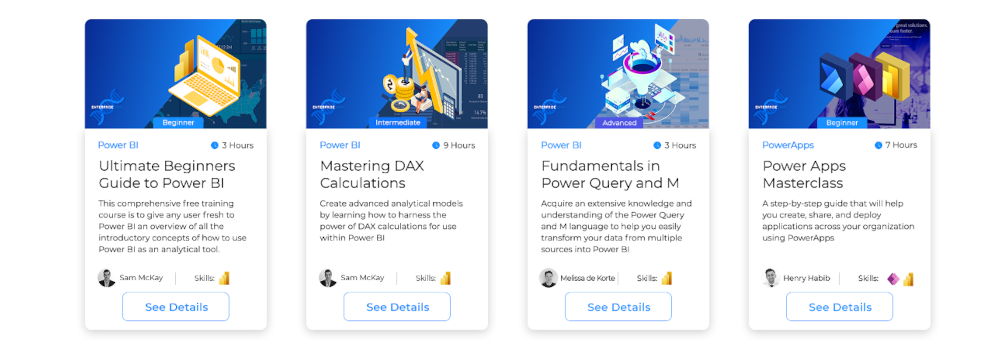Our content is reader supported, which means when you buy from links you click on, we may earn a commission.
How Sam McKay Takes the Portfolio Approach to His 6-Figure Monthly Data Analysis Training Company

- Who: Sam McKay
- Website: enterprisedna.co
- Course Topic: Data Analysis
- Interesting Stats: 20 people on staff
Who are you and what digital training company have you created?
Enterprise DNA is an online skills development platform empowering data analysts worldwide. We’ve always been very focused on Power BI users. We have recently expanded and evolved to cover various other tools and technologies in the Microsoft analytical ecosystem.
We have been around for about 6 1/2 years. We’re one of the first online content creators to produce power BI-specific training and resources. It was a very new technology around that time.
In our early days, we just focused on online video tutorials. We have also recently expanded to include extensive resources, tools, and community events to add more user value.
We also recently launched our new digital platform, enabling users to create customized learning plans to work through our content and resource assets.
What market does your digital training serve?
Enterprise DNA is wholly focused on data analysts all around the world. We feel a significant need to upskill data capabilities across the board. Everything includes some data management or data analysis these days. Even if you aren’t doing the analysis or visualization yourself, you still need to know how to comprehend and act on the data.
I’m in it to help support individuals and their learning journey or organizations looking to build a strong data culture and trying to get the most out of their data assets.
What’s the biggest benefit of taking your online courses?
We have the most practically focused content and resources available anywhere. We take users from start to finish on how to create analysis and reporting applications that will add value to their organizations and themselves.
A couple of hours of course content with a digital platform empowers the user to learn in their way. It’s also within a framework that will enable them to scale their development and initiatives.
How did you get into the market?
I was a very early adopter personally of Power BI when Microsoft first released it. At that time, I was working in a large organization in New Zealand and could recreate all of the reporting that had been created in the previous two to three years and about one month. I knew right at that time this was going to be huge.
This technology changed the game entirely up and down everything you needed to do with data. It has played out exactly how I thought, with power BI being one of the most popular new technologies of the past decade. And not only that, they’ve continued to build an ecosystem around power BI that includes power apps, power automation, and various other integrations with other data languages and technologies.
Why did you decide to create a digital training company?
I didn’t initially create a digital training business when I first started; I trialed a few different things, including doing some ad hoc consulting and live training events. I did realize, though, that if you wanted to reach the biggest audience, you could you needed to focus online.
It started with just a YouTube channel, and then once that content was growing and I saw a lot of traction, I realized there was a real need for more structured learning in a digital platform. - Sam McKay Click To TweetWe started with just a handful of courses on specific topics, growing to an extensive library of courses, labs, virtual events, and much more.

Did you have any moments of doubt before you launched your training company?
I knew from the traction we were getting on YouTube that there was a reasonable demand for structured learning around some of the more complex topics associated with learning how to do data analytics well.
Also, power BI, on the face of it, looks simple, but once you start digging into it, you can very quickly get overwhelmed and confused. Having some guided learning was a perfect way to learn quicker and get up to speed with best practices.
If so what made you turn it around and do it anyway?
I was pretty confident that there was some demand. You never know how much market, but just by a few data points, I knew there would be at least a couple of 1000 people overtime who would need this.
What are your online courses like?
They have evolved, but they combine all of the above. Over the last few years, I genuinely believe that the bar has been raised by what users expect from an online course provider. Just putting out a few videos is not enough these days. There’s so much high-quality content available everywhere, in most cases for free and very cheap that you need to have an entire learning experience laid out for users to feel like they’re getting the value. That includes including all of the things you listed above in the question.
How long does it take you or your team to create a new course?
It can honestly take quite a long time, depending on the topic you are covering. In the beginning, we spend a lot of time making sure that the content list and the chapters laid out are what we believe our users will be interested in and stay engaged in.
After this is approved, the content creator needs to go and create the videos, which can sometimes take a while, depending on how confident they are and at ease they are recording themselves.
Tell us a little about the process of launching your first course and getting your first enrollment(s).
The first course I ever created was very rough; I have to say. I didn’t have the right equipment, like the right microphone or video recorder. So there were a few false starts right at the beginning.
I always told myself, though, that you’ve got to create the content and course and spend a lot of time selling it and marketing it.
There's no point in creating something if you aren't going to shout about how good it is and how much it can benefit others. - Sam McKay Click To TweetI mean, that’s like a no-brainer, but I think it’s forgotten a lot that some creators and experts think that if they come out there, people will come, but unfortunately, it doesn’t happen like that.
So in my view, you’ve got to think about both creating the content and how you will get it out there and how people will know that you exist.

Do you have a lead magnet?
Yes, we have had a ton of lead magnets and various other promotions to get more people aware of us.
I've always taken a portfolio approach to the market. I don't just rely on one thing to get all our leads. - Sam McKay Click To TweetThere’s too much risk in doing that, so having several things simultaneously de-risks the potential platform or acquisition problems you might face.
As mentioned above, you need to find ways for potential customers to see and know you. A lead magnet is just one way that you can do that. But these days, there are several ways you can attract potential users—for example, social media, YouTube, blogs, etc.
What’s the traffic strategy that works best for you?
As mentioned above, we do a little bit of everything. Even if one is better, I’ve decided to run a portfolio of ways to attract traffic. This is a strategic decision for the longevity of the business. Once you start growing and it’s more than just yourself; for example, we have 20 people on staff now; you always need to think about risks to make payroll, pay the bills, etc.
Putting your eggs into one basket to get traffic is not a sound strategy. Things can change, most of which would be totally out of your control in a digital environment. Taking a portfolio approach just like you would with investing over the long term makes a lot of sense.
What online course platform are you using?
We used Teachable for a long time, and I thought their platform was outstanding. We were able to onboard thousands of customers over a multiyear time. And we could also do several customizations that I wanted to do up to a point.
As we have grown and wanted to do more for our users, we decided a year ago that we needed our technology. We saw that the market was just being saturated by everyone putting online videos in a course. This was not enough for users to remain sticky and to see the value in their content and platform.
So we’ve now gone in a completely new direction and built the entire CMS technology stack ourselves. Now we have many features that aren’t even possible with any of the generic platforms listed above. We have completely customized learning plans that take inputs from a user and then run an algorithm to bring unique learning plans and content plans to our users. We also track absolutely everything our users do on the platform and provide that reporting to them and their managers in real time.
These are just some of the enhancements we’ve made. There are many, many more that have only been made possible with our technology.
Do you like it?
I did like Teachable for a long time, and they look after many of the more complex parts of running an online business. It is an out-of-the-box service, and for what we were able to make as a business compared to the cost of the platform, it was pretty amazing the value generation to cost.
As mentioned, we decided to move on because of technology limitations. We just felt we needed to do more with our user experience, so we started from scratch and built it ourselves.

Are there any features you wish it had?
Tons, that’s why we built our platform. You can only customize Teachable so far.
What made you decide to use your chosen platform over others?
The bar has risen so much higher over the years as everyone with a microphone and a camera has created or can create an online course. So you've got to think bigger. You've got to think better. - Sam McKay Click To TweetThat’s what we’ve done with our new platform and new technology.
Users want to get the answers quickly and exactly when they need them. I think also if you look at what is happening with short-form video, that also requires some analysis. That going to be the way users want to learn in the future.
What other tools do you use to run your digital training business?
Stripe, Drip, Leadpages, and many other marketing tools.
You need to spend 5x marketing your content than actually creating it. That maybe is an underestimation as well.
What books or training programs have you found useful on your journey to a successful business owner that others might find valuable too?
A lot of YouTube, blogs, Googling, and various books (none stand out).
Just constant reading and learning.
Change is happening so fast these days and you have to stay on top of so much.

Do you have any big mistakes you’ve made along the way that you’d be willing to share?
I would say a lot of little mistakes rather than any massive ones. I’ve spent a lot of money on trialing out new technologies and trying to create new offerings for our users. Most of these have been a distraction, and we’ve wasted time and money on them. But I don’t see it as that big of an issue. Sometimes, you must let your creative side go and test out a few things. there’s no harm in giving things a go if they don’t cost you everything, and you can quickly iterate from them if they don’t work.
Please share some idea of revenue for your digital training company.
Across all of our revenue streams currently, we make just above six figures monthly as a business.
Please tell us a little about what the money you’ve earned from running your digital training company has done for you.
To be completely honest, the vast majority has been reinvested back into the business via new hires, now content creator partnerships, new technology, and more.
We’re trying to build something unique here. That doesn’t happen if you take all the money out of business.
In addition to revenue are there any numbers you would like to share?
80K YouTube subscribers.
We have collected well over 100K emails since we started.
Add >3K emails/new platform sign-ups each month currently.
What has creating your digital training business done for you personally?
I had a great time. There are many up and then down months. Sometimes it’s an emotional rollercoaster. Thinking long-term and trying to build a fantastic platform where users get a lot of value keeps me and the team going and excited about the future.
What advice do you have for people just starting out?
Think big but start small. There’s a lot to get right to be successful, but anyone can do it. You need to be patient and make good, small decisions daily.
Learn more about Sam McKay of enterprisedna.co:
- Website: enterprisedna.co